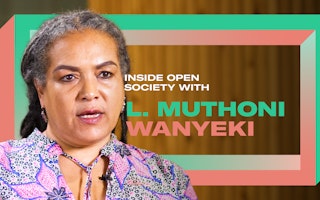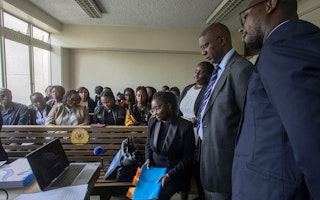Tragedies of the Stateless
By Adam Adam
“Are my documents in order?” I asked the official. This was my fifth attempt in ten years to obtain a Kenyan passport. Now I was before the Criminal Investigations Department for an in-person “vetting.”
“Identification cards could be forged, and so people’s pictures,” was the official’s response. Of course, the vetting process, which has existed in Kenya for the last 20 years, targets only members of select ethnic, religious, and racial groups. As a fourth-generation Nubian—a group long discriminated against in Kenya—it was no surprise that I had been selected.
The government insists that the vetting process is a security measure that keeps the country from being infiltrated. But what has the vetting really achieved? And more importantly, what does it imply when people are qualified as individuals of a tribe rather that members of a nation?
Years of not being able to obtain a passport had taken a toll on my life. I lost out on job opportunities. I had to forfeit two scholarships. I wasn’t able to travel abroad to compete with my rugby team. I even had to change my career, all because the government wouldn’t issue me a passport.
The operative word in my life was “stateless.”
My situation was marginally better than many Nubians in Kenya. When I turned 18 I had applied for, and the government had issued (thanks in part to my enrollment at an elite high school), an identification card. My three siblings, however, were not so lucky. They applied for their identification cards in 1991, 1994, and 1996 and only received their documents in 2007. But as a Nubian, even my own government-issued ID was not sufficient proof of my right to Kenyan nationality or a passport.
Unfortunately, my story is not an isolated case of government bureaucracy gone awry. Across the continent, the laws and practices that govern citizenship leave hundreds of thousands of people without a nationality. Those rendered stateless are often unable to vote, enroll their children in school, own property, work for the government, or, like me, travel freely. Their lack of documentation exposes them to human rights abuses and fuels existing tensions.
Yet this lack of status is not a popular discourse. Victims exist in the shadows. When the public does learn of examples of statelessness it is often too late—the damage to the victims is already too deep. To me that is not the tragedy. The real tragedy is in resolving the problem, if there are any solutions.
Some people say statelessness is a problem enforcement of the laws. Nevertheless, people look to these same laws for a solution. In 2003, we mobilized the Nubians elders to represent their community facing my same predicament. A Nubian elder told the gathering, “Today, we face world and take to court not only for justice but to prove to our posterity that we have done everything humanly possible to solve this problem.”
Despite our faith in the law, the Kenyan courts demanded that the Nubians provide 120,000 signatures to show that they were afflicted. For nearly a decade now, the case has languished in court. Several other cases on this issue are also outstanding. But what will happen when we have decisions? I fear that the decisions will only be words on paper and won’t bring real change to people’s lives.
The government did finally granted me a passport, but my struggle with statelessness did not end there. I soon discovered that you could not use a passport to invest in your future. I was told that I could not apply for the National Social Security Fund with a passport because it did not contain important information about my tribe. “Is a passport a lesser document?” I remember asking. My identity card also lacked this information and it took many protracted negotiations before I was finally able to receive a social security fund card.
Lack of effective citizenship is disruptive to the victims. It affects individuals’ enjoyment of human rights and freedoms. It shatters national cohesion and integration. It creates marginal groups and impoverishes communities. One look at Côte d’Ivoire and the civil war triggered by the decision to strip an entire ethnic group of their citizenship is all it should take to impress upon people how serious of a this problem is. Statelessness is a problem for West African stability even today.
Existence of a single stateless person is any country a tragedy. It is catastrophic to have stateless people in thousands and millions. Statelessness does do not choose its victims. Former President Kenneth Kaunda of Zambia was once denationalized as was Ivorian politician Alassane Ouattara. In Tanzania, Jenerali Ulimwengu, a former Ambassador and now a columnist with the East Africa, was among those stripped of their nationality. While some of these people regained their nationality through courts, it took a civil war to reinstate the nationality in Côte d’Ivoire.
To me statelessness is the tragic outcome of public silence and government actions. As Kenyans, have we ever discussed what constitutes our nationality? We do not talk about our nationality except through whispers because of its apparent sensitivity. Activists work on issues of voting and freedom of movement when what they really seek to question is what make one a national. Policy makers and government administrators would rather discuss procedures and process of obtaining citizenship and not the effects of what they do.
I grew up in the era where we sang, “Tushangilie Kenya Taifa letu Tukufu, Kenya Tunayoipenda. Daima!” (Let’s celebrate our glorious country. Always!) and I believed in all those words. I continue to believe in Kenya’s promise. Our country is too important to be associated with statelessness or go the route of civil war because of questions of belonging. Our new Constitution provides for nationality to children from birth. It also makes it a state responsibility to issue nationality documents (including passports and identification cards). I just hope such value will be realized and not lost in legislation.
Until 2016, Adam Hussein Adam was the Africa program officer for the Open Society Justice Initiative’s citizenship and statelessness project.


